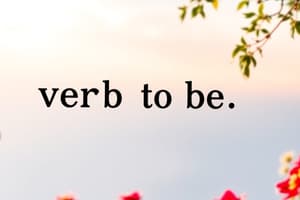Podcast
Questions and Answers
What type of verb is used in the sentence 'She feels happy'?
What type of verb is used in the sentence 'She feels happy'?
- Auxiliary verb
- Linking verb (correct)
- Intransitive verb
- Transitive verb
Which sentence correctly demonstrates the use of 'to seem' with a modified noun?
Which sentence correctly demonstrates the use of 'to seem' with a modified noun?
- That seems to grow everyday.
- That seems a strange statement to me. (correct)
- That seems strange.
- That seems better than before.
Which of the following sentences uses the verb 'tastes' as a transitive verb?
Which of the following sentences uses the verb 'tastes' as a transitive verb?
- The soup tastes salty.
- Mom tastes the soup. (correct)
- The food tastes delicious.
- She tastes something sweet.
Which verb in the sentence 'Jim felt a pain in his arm' is classified as a transitive verb?
Which verb in the sentence 'Jim felt a pain in his arm' is classified as a transitive verb?
Which example indicates a linking verb based on the replacement test with 'to be'?
Which example indicates a linking verb based on the replacement test with 'to be'?
In which of the following sentences is 'remained' functioning as a linking verb?
In which of the following sentences is 'remained' functioning as a linking verb?
In the sentence 'The cake smelled burned', what is the function of the verb 'smelled'?
In the sentence 'The cake smelled burned', what is the function of the verb 'smelled'?
Which of the following sentences has a linking verb?
Which of the following sentences has a linking verb?
Which of the following sentences is correctly transformed into a future tense question?
Which of the following sentences is correctly transformed into a future tense question?
Identify the correct future tense statement transformed from the past tense: 'They jumped.'
Identify the correct future tense statement transformed from the past tense: 'They jumped.'
What is the correct change for 'He sang in the choir.' into future tense?
What is the correct change for 'He sang in the choir.' into future tense?
Select the correctly transformed future tense question for 'You spell it correctly.'
Select the correctly transformed future tense question for 'You spell it correctly.'
Which of the following is an awkward form of a future tense question?
Which of the following is an awkward form of a future tense question?
Transform 'Ms. Garcia cut.' into a future tense statement.
Transform 'Ms. Garcia cut.' into a future tense statement.
Which of the following shows the correct use of 'shall' in a future tense question?
Which of the following shows the correct use of 'shall' in a future tense question?
Identify the incorrect transformation of 'It seemed.' to a future tense sentence.
Identify the incorrect transformation of 'It seemed.' to a future tense sentence.
What number should be assigned to the imperative 'Stay in your line until called'?
What number should be assigned to the imperative 'Stay in your line until called'?
In the sentence 'Please send me your latest catalog,' how should this imperative be classified?
In the sentence 'Please send me your latest catalog,' how should this imperative be classified?
What distinguishes an imperative that receives the number 3 from one that receives the number 4?
What distinguishes an imperative that receives the number 3 from one that receives the number 4?
Which sentence below represents a general command warranting the number 4?
Which sentence below represents a general command warranting the number 4?
Which sentence is indicative of an allowed action linked to the number 3?
Which sentence is indicative of an allowed action linked to the number 3?
What does the phrase 'used to' indicate in a sentence?
What does the phrase 'used to' indicate in a sentence?
Which of the following sentences correctly uses 'be used to'?
Which of the following sentences correctly uses 'be used to'?
In the context of negation, where should 'not' be placed in the sentence 'You will be late'?
In the context of negation, where should 'not' be placed in the sentence 'You will be late'?
Which of the following sentences demonstrates the use of 'used to be'?
Which of the following sentences demonstrates the use of 'used to be'?
When negating 'I shall be there', what is the correct structure?
When negating 'I shall be there', what is the correct structure?
Which of these questions uses the correct placement of 'not'?
Which of these questions uses the correct placement of 'not'?
Which modal auxiliary would not appropriately replace 'have to' in 'You have to help me'?
Which modal auxiliary would not appropriately replace 'have to' in 'You have to help me'?
Which of the following modals omit 'to' when used before an infinitive?
Which of the following modals omit 'to' when used before an infinitive?
Which statement about the modal 'have got to' is true?
Which statement about the modal 'have got to' is true?
What is the correct past tense form for 'I am supposed to play'?
What is the correct past tense form for 'I am supposed to play'?
Which of the following sentences uses 'ought to' correctly in the past tense?
Which of the following sentences uses 'ought to' correctly in the past tense?
Which adverb best indicates a regular action based on past habits?
Which adverb best indicates a regular action based on past habits?
Which of the following sentences indicates a habitual action using a linking verb?
Which of the following sentences indicates a habitual action using a linking verb?
When the verb 'have' is used transitively, what does it imply in relation to the action?
When the verb 'have' is used transitively, what does it imply in relation to the action?
Which statement correctly distinguishes between completed actions and habitual actions in the past tense?
Which statement correctly distinguishes between completed actions and habitual actions in the past tense?
Which of the following adverbs does NOT suggest regularity or habit?
Which of the following adverbs does NOT suggest regularity or habit?
What best describes the action expressed in 'Mark has the jitters before a concert most of the time'?
What best describes the action expressed in 'Mark has the jitters before a concert most of the time'?
Which sentence showcases a completed action?
Which sentence showcases a completed action?
Which statement illustrates the regular use of a linking verb with an appropriate adverb?
Which statement illustrates the regular use of a linking verb with an appropriate adverb?
Which sentence demonstrates the use of the past perfect tense for a habitual action?
Which sentence demonstrates the use of the past perfect tense for a habitual action?
What is the role of adverbs in presenting perfect tenses?
What is the role of adverbs in presenting perfect tenses?
Which example indicates a future tense action with a habitual behavior?
Which example indicates a future tense action with a habitual behavior?
Identify the sentence that shows a completed action using the present perfect tense.
Identify the sentence that shows a completed action using the present perfect tense.
In which sentence is the linking verb used to indicate a completed action?
In which sentence is the linking verb used to indicate a completed action?
Which sentence correctly uses the past perfect tense for a completed action?
Which sentence correctly uses the past perfect tense for a completed action?
Which of the following represents a future tense statement about a regular action?
Which of the following represents a future tense statement about a regular action?
Which sentence best illustrates a complete action that does not indicate habitual behavior?
Which sentence best illustrates a complete action that does not indicate habitual behavior?
Flashcards
Future Tense Questions
Future Tense Questions
"Will" and "shall" are used in future tense questions, but they are not used as a direct substitution for the "will" in a statement.
Auxiliary Placement
Auxiliary Placement
In future tense questions, the auxiliary "shall" or "will" is placed before the subject.
Rewriting to Future Tense Questions
Rewriting to Future Tense Questions
To turn a present/past tense statement into a future tense question, change the subject-verb order and add "will" or "shall".
Transitive "Have"
Transitive "Have"
Signup and view all the flashcards
Conjugation of Have
Conjugation of Have
Signup and view all the flashcards
Past Tense of Have
Past Tense of Have
Signup and view all the flashcards
Present tense of "Have"
Present tense of "Have"
Signup and view all the flashcards
Future Tense of Have
Future Tense of Have
Signup and view all the flashcards
Habitual Adverbs
Habitual Adverbs
Signup and view all the flashcards
Transitive Verb with 'Have'
Transitive Verb with 'Have'
Signup and view all the flashcards
Linking Verbs with Habitual Adverbs
Linking Verbs with Habitual Adverbs
Signup and view all the flashcards
Past Tense - Completed Action
Past Tense - Completed Action
Signup and view all the flashcards
Past Tense - Habitual Action
Past Tense - Habitual Action
Signup and view all the flashcards
Used to
Used to
Signup and view all the flashcards
Be used to
Be used to
Signup and view all the flashcards
Used to be
Used to be
Signup and view all the flashcards
Have got to
Have got to
Signup and view all the flashcards
Modals that omit 'to'
Modals that omit 'to'
Signup and view all the flashcards
Bare infinitive
Bare infinitive
Signup and view all the flashcards
Have to
Have to
Signup and view all the flashcards
Have got to
Have got to
Signup and view all the flashcards
Linking Verb
Linking Verb
Signup and view all the flashcards
Transitive Verb
Transitive Verb
Signup and view all the flashcards
Adjectives
Adjectives
Signup and view all the flashcards
Noun
Noun
Signup and view all the flashcards
Direct Object
Direct Object
Signup and view all the flashcards
To Be Test
To Be Test
Signup and view all the flashcards
Become
Become
Signup and view all the flashcards
Remain
Remain
Signup and view all the flashcards
Past Perfect Tense
Past Perfect Tense
Signup and view all the flashcards
Present Perfect Tense
Present Perfect Tense
Signup and view all the flashcards
Future Tense
Future Tense
Signup and view all the flashcards
Completed Action
Completed Action
Signup and view all the flashcards
Habitual Action
Habitual Action
Signup and view all the flashcards
Past Participle
Past Participle
Signup and view all the flashcards
Permission Imperative
Permission Imperative
Signup and view all the flashcards
Command Imperative
Command Imperative
Signup and view all the flashcards
Negation of 'To Be'
Negation of 'To Be'
Signup and view all the flashcards
Negation with Auxiliaries
Negation with Auxiliaries
Signup and view all the flashcards
Negation in Questions
Negation in Questions
Signup and view all the flashcards
Negation of 'To Have'
Negation of 'To Have'
Signup and view all the flashcards
Linking Verb with 'Have'
Linking Verb with 'Have'
Signup and view all the flashcards
Study Notes
English Verb Drills Study Notes
- The book is designed to help students develop skills in using verbs effectively, reviewing conjugations, tenses, voice, mood, and verb usage.
- The book addresses irregularities and usage patterns of English verbs.
- It includes various exercises for quick review and memorization.
- The book is suitable for beginning and intermediate learners.
- It includes a mastery check for learners to verify skill development.
- There is an appendix containing an extensive list of irregular English verbs.
Studying That Suits You
Use AI to generate personalized quizzes and flashcards to suit your learning preferences.



